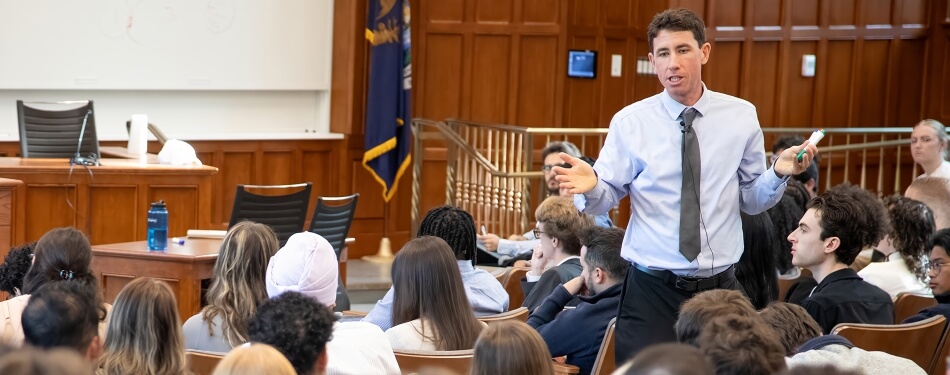A new set of online courses taught by Professor Patrick Barry explores the uses and dangers of artificial intelligence.
The four-part series, AI For Lawyers and Other Advocates, launched November 4 on Michigan Online and Coursera. It is part of a portfolio of more than 30 online courses on AI the University is developing with the help of its Center for Academic Innovation (CAI).
All of the courses are offered free of charge to Michigan students, alumni, faculty, and staff.
“Generative AI is transforming teaching and learning in higher education, just as it has the potential to transform jobs and industries across our society,” said Laurie McCauley, provost and executive vice president for academic affairs, in announcing the new classes. “These courses will allow learners to build skills they can use to advance their careers and build vital new job skills.”
Barry—who has previously developed other online courses with CAI—said the new course is based on a popular in-person class he has taught called Digital Lawyering: Advocacy in the Age of AI. The goal of the online version is to give a broader pool of people the chance to experiment with and critically assess a wide range of AI tools.
“I try to get my students to approach artificial intelligence with both an exploratory mindset and an evaluative one,” Barry said. “What are its strengths? What are its limitations? And how might this technology shape the way we study and practice law?”
Specific topics covered in the course include:
- Using AI to become a better writer and speaker
- Using AI to become a better problem solver
- Spotting “AI snake oil” (i.e., overhyped AI claims)
- Using AI to delegate tasks and manage your time more efficiently
- Avoiding “delegation remorse” (regretting handing over to a computer a task that you should probably do yourself)
- Using AI as a “feedback machine”
- Addressing AI bias
- Preventing a world in which researchers and advocates “produce more, but understand less”
Barry said the syllabus is designed to be dynamic, and he plans to update it in response to new developments in the field. In addition, the online format allows students to work at their own pace and customize the experience to their specific needs and interests.
“The course is called AI for Lawyers and Other Advocates because it covers skills and concepts that we hope will be useful to more than just attorneys. Social workers might benefit from taking it. Teachers might benefit from taking it. So could consultants, journalists, policy experts, and anybody else whose job involves a combination of digital communication, critical thinking, and persuasion. Given that artificial intelligence is by no means a single-industry technology, we really tried to make the course as inclusive and interdisciplinary as possible.”







